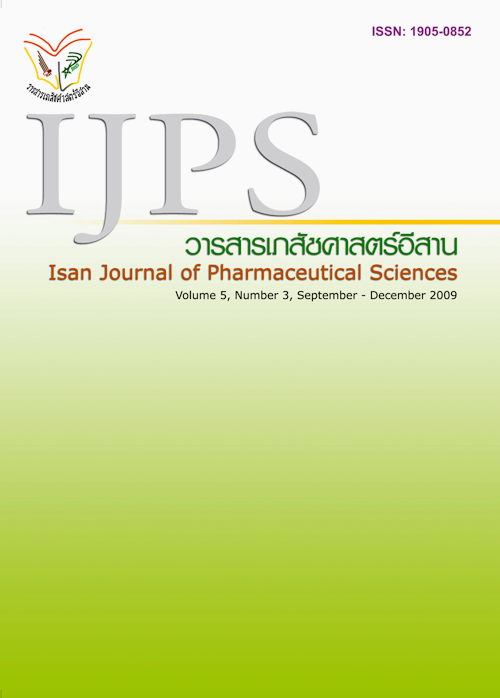Effects of Counseling on People at High Risk Group of Type 2 Diabetes in Ruampattanasrimongkoln Community, Mukdaharn Province
Main Article Content
Abstract
This study is of one group pretest-posttest experimental design. Its aims were to compare (1) the level of fasting blood sugar, (2) the controllable risk factors, and (3) knowledge about disease and behavior in people at high risk of type 2 diabetes pre and post counseling. Sixty-eight people at high risk of type 2 diabetes were recruited between the first January and 28th February, 2008 at Ruampatanasrimong Community, Mukdaharn Province. Results indicate that the level of fasting blood sugar (from 110.103±6.0435 to 100.45±11.73 mg/dL) and frequency of carbohydrate consumption, stress, and exercise improved significantly after receiving counseling (p=0.001 and p < 0.001, respectively). In addition, knowledge of diabetes and behavior improved significantly after counseling from 12.38±2.70 score to 15.5±0.74 score (p < 0.001). However, there was no significant difference in smoking and alcohol drinking. From this study, we can conclude that 2-month counseling is beneficial for people in high risk groups for type 2 diabetes. It can improve knowledge about disease and behavior, the level of fasting blood sugar and food consumption behavior, stress and exercise. The effect of counseling on smoking and alcohol drinking behavior is still unclear, however. Therefore, future studies should focus on smoking and alcohol drinking behavior.
Article Details
In the case that some parts are used by others The author must Confirm that obtaining permission to use some of the original authors. And must attach evidence That the permission has been included
References
American Diabetes Association. Standards of medicalcare in diabetes-2006. Diabetes Care [serial online] 2006 Jan; [cited 2006 May 11];29(S4-42): [39 screens]. Available fromhttp://care.diabetesjournals.org/cgi/reprint/29/suppl_1/s4.
Diabetes Prevention Program Research Group. Reduction in the incidence of type 2 diabetes with lifestyle intervention or metformin. N Engl J Med 2002; 6(346): 393-403.
Gillies CL, Abrams KR, Lambert PC, et al. Pharmacological and lifestyle interventions to prevent or delay type 2 diabetes in people with impaired glucose tolerance: systematic review and meta analysis. BMJ 2007; 334(7588):299.
Mijares AH, Izquierdo ES, Mecho FB, et al. Obesity and overweight prevalences in rural and urban populations in East Spain and it association with undiagnosed hypertension and Diabetes Mellitus: a cross-sectional population-based survey. BMC Res Notes 2009 Jul; 2(1): 151.
Tuomilehto J, Lindström J, Eriksson JG, et al. Prevention of type 2 diabetes mellitus by changes in Lifestyle among subjects with impaired glucose tolerance. N Engl J Med2001; 344(18): 1343-1350.
Weycker D, Nichols GA, O'Keeffe-Rosetti M, et al. Excess risk of diabetes in persons with hypertension. J Diabetes Complications 2008May; 29: 1-7.


